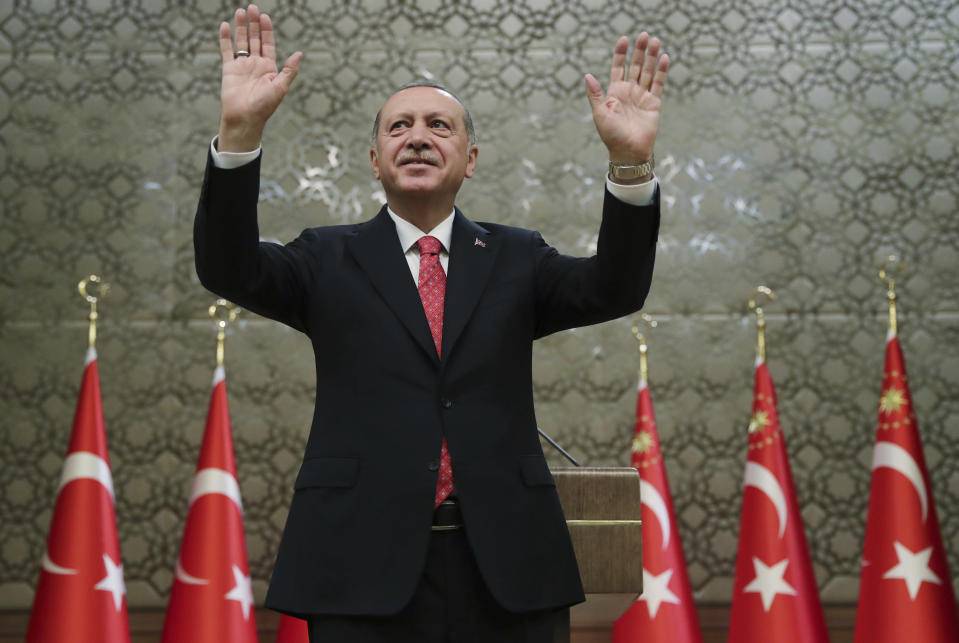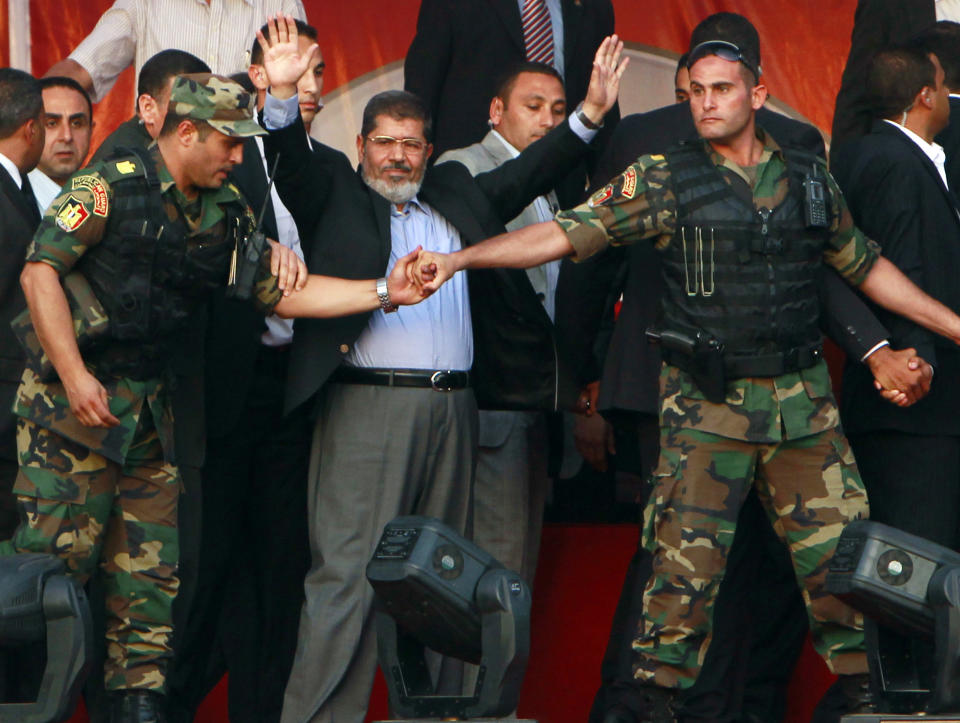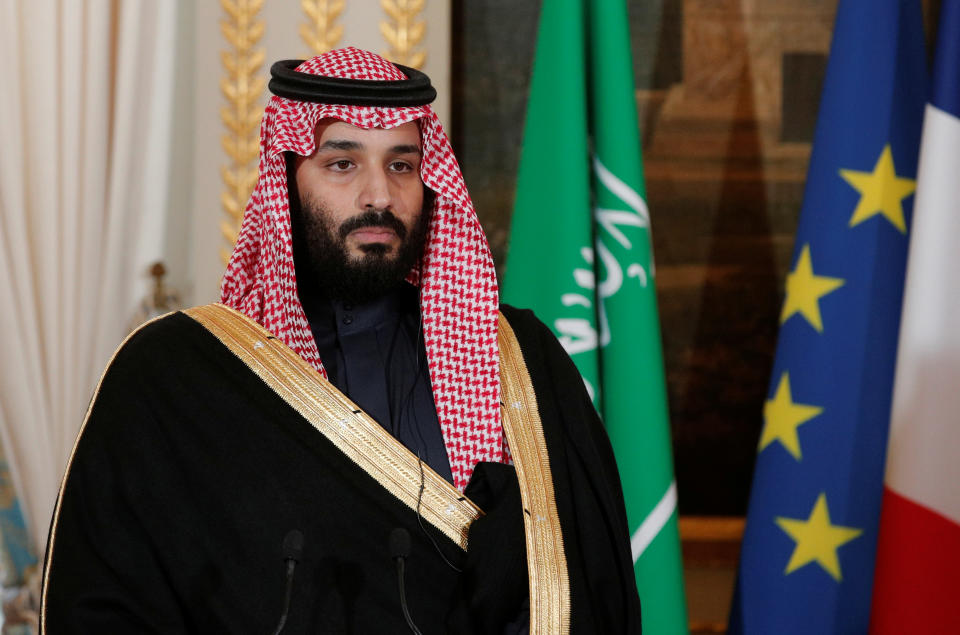Why the Khashoggi case is a battle over leadership of the Islamic world

Seven years ago, while investigating the story of a Muslim Brotherhood figure living in the United States, I spoke with a supporter of the Justice and Development Party about the relationship of Recep Tayyip Erdoğan, then the prime minister of Turkey, with the Islamist organization.
“The flag raises from where it has fallen,” said the supporter, who is now a high-level Turkish government official in Ankara, referring to the goal of reviving Turkish leadership in the Muslim world more than 80 years after the abolition of the Ottoman Caliphate in 1924.
To some extent, he was putting down the Muslim Brotherhood, a transnational Sunni Islamist organization founded in Egypt in the 1920s, and arguing that Turkey’s nationalist political Islam movement had a stronger hold over Turkish Islamists, including Erdoğan.
Recently, in the aftermath of Saudi journalist Jamal Khashoggi’s disappearance at the Saudi consulate, I heard this sentiment again — this time from now President Erdoğan himself. In a speech to Turkish religious officials in Ankara on Monday, he said, “Turkey is the only country that can lead the Muslim world.”
In the West, the most simplistic narrative is that Khashoggi, who is widely presumed dead, was killed by the Saudi regime for daring to criticize the kingdom’s de facto ruler, Mohammad bin Salman. There is truth to that narrative, but Khashoggi’s death in Istanbul has much deeper roots in a larger battle for regional hegemony.

When the Arab uprisings started in 2011, Erdoğan quickly sided with members of the Muslim Brotherhood — or Ikhwan, as members and sympathizers in Turkey prefer to call it — throughout the region, from Egypt to Syria. He supported Ikhwan-related groups financially and logistically. He lobbied for these groups on the international scene. In Egypt, a member of the Muslim Brotherhood, Mohammed Morsi, even came to power.
At that point, however, Khashoggi wasn’t on the same side as Erdoğan. In fact, during the Gezi protests in Istanbul in 2013, when millions rose up against Erdoğan’s oppressive policies and a wave of demonstrations lasting weeks spread across the country, Khashoggi was with the people of Turkey struggling against their own authoritarian leader. He shared covers of the Economist magazine depicting Erdoğan as a sultan on his social media account, and he even mocked Erdoğan, tweeting, “Sultan Recep I, sure he will not like the cover. But perhaps he likes the idea of the Sultan!”
Khashoggi may have been inspired by Gezi, but back then he could also afford to alienate Turkey’s leader. Saudi Arabia’s King Abdullah was still alive, Saudis and Qataris were working together in Syria, and the Muslim Brotherhood was running Egypt. Khashoggi himself was in a good position in Riyadh, but his connections were not to Mohammed (at that time an adviser and then chief of staff to his father) but to the “Faisal clan — Turki and his brother Saud al-Faisal, the longtime Saudi foreign minister,” according to Maggie Mitchell Salem, one of Khashoggi’s friends, who spoke recently to David Ignatius of the Washington Post.
But the geopolitics shifted quickly. Morsi was toppled by the military in the summer of 2013, one year after being elected president. King Abdullah of Saudi Arabia, who was working with Erdoğan in Syria, died in 2015. And Mohammed, who became the de facto leader of Saudi Arabia, joined Egypt and UAE to pursue a war against the Muslim Brotherhood everywhere in the region. A war of regional hegemony erupted between two Sunni camps: Turkey and Qatar on one side, and Saudis, Egyptians and Emiratis on the other.

The scrimmage between the two blocs escalated in 2017, when a coalition of Gulf countries launched a blockade against Qatar. Khashoggi was forced to pick a side, and he changed his tone about Erdoğan. When Khashoggi interviewed Erdoğan in 2016, the two men had already developed a warm relationship. And just before the presidential and parliamentary elections in Turkey in June 2018, Khashoggi supported Erdoğan in his tweets and criticized his opponents.
This political shift was a reflection of another key change in Riyadh, where Khashoggi was losing his base of support. Mohammed had been appointed crown prince in June 2017.
“When I speak of the fear, intimidation, arrests and public shaming of intellectuals and religious leaders who dare to speak their minds, and then I tell you that I’m from Saudi Arabia, are you surprised?” Khashoggi wrote in his first sentence of his first column for the Washington Post on Sept. 18, 2017.
In November 2017, the crown prince began his purge, arresting more than 200 princes, ministers and businessmen and holding them for weeks at the Ritz-Carlton Hotel in Riyadh on anticorruption charges. Khashoggi’s ties in the palace were cut. The purge swept up Prince Alwaleed bin Talal too, a Saudi billionaire who two years earlier had provided Khashoggi with financial support to establish a new television channel in Bahrain. The two had become so close that Khashoggi posted pictures that he took of them traveling together to Paris and Bahrain. When Crown Prince Mohammed arrested Alwaleed, Khashoggi spoke up. In his Washington Post column, he compared the ruler’s actions to Putin’s.
His new life in Turkey most likely only deepened suspicions in the palace that Khashoggi was aligned with the Muslim Brotherhood. By 2018, he had started a relationship with Hatice Cengiz, a Turkish researcher. The two, who became engaged, had met during a forum hosted by Al Sharq, which is considered a pro-Muslim Brotherhood media outlet. She was also writing analyses on the crisis at Gulf Cooperation Council, and some of her papers were published by INSAMER, the think tank of IHH, a Turkish nongovernmental organization that is known for coordinating the Gaza Freedom Flotilla in 2010 and that is close to Ikhwan. On social media, in which she tweets mostly in Arabic, she has expressed sympathy for Ikhwan.

In the last few months, Khashoggi openly supported the Muslim Brotherhood and harshly criticized the crown prince and the U.S. administration for their stand against the movement. “The coup in Egypt led to the loss of a precious opportunity for Egypt and the entire Arab world,” Khashoggi wrote in his Washington Post column in late August. “If the democratic process had continued there, the Muslim Brotherhood’s political practices could have matured and become more inclusive, and the unimaginable peaceful rotation of power could have become a reality and a precedent to be followed.”
On Sept. 11, in his last piece published before his disappearance, Khashoggi wrote that the crown prince “must also accept that the Houthis, the Islah [Sunni Islamists] and the southern separatists should play a future role in the governance of Yemen.” Advocating for the Islamist Al-Islah Party, which was blacklisted by the Saudi government because of its ties to the Muslim Brotherhood, opened another and possibly fatal front.
Just a few weeks later, Khashoggi entered the consulate in Istanbul and disappeared. Two private jets owned by Sky Prime Aviation, which belongs to the Saudi government, took off from Atatürk Airport that same day. One of them carried six high-level Saudi security personnel headed to Cairo, and the other took seven people to Dubai.
Those destinations reflect the current regional alliances: The UAE is heavily involved in the Saudi-led war in Yemen, and Cairo is pursuing a longtime fight against Muslim Brotherhood members. “Both Egypt and the UAE have come out defending the Saudis,” says Bruce Riedel, senior fellow of Brookings Institution and a former CIA analyst who recently wrote a book about Saudi Arabia. “Perhaps they also played some role in the operation. There is no evidence of that aside from the suspicious stops in Cairo and Dubai.”

Three days after Khashoggi’s disappearance, Cengiz, his fiancée, wrote in a tweet: “I remain confident that my dear government will help me to know his fate and bring joy to my heart.”
She was right. The Turkish government has pursued the case and even helped fuel international media coverage through leaks. This is not because Erdoğan is an ardent supporter of freedom of the press — he most certainly is not — but because it gives him the upper hand with the crown prince in the regional conflict.
Khashoggi, who picked Erdoğan in this struggle for influence, is perhaps the most striking casualty of this war within the Sunni world. And what greater symbolism is there than to be killed and dismembered in the old capital of the Ottoman Empire, whose heirs are battling to reclaim leadership of the Muslim world?
Tolga Tanis is the former Washington, D.C., correspondent for the Turkish newspaper Hurriyet.
_____
Read more from Yahoo News:
Khashoggi friend says journalist angered Saudi government with column
Facebook accused of conservative bias over Kavanaugh article fact-check
California’s ‘Queen of Green’ fights Trump to set stricter pollution rules
In the new cold war, Western democracies are losing ground to Russia
Photos: Honduran migrant caravan pushes north toward the U.S.
Hear the latest episode of Skullduggery, our podcast on scandals in the Trump era


